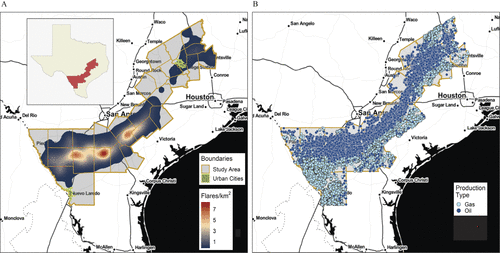Kate Vavra-Musser, Meredith Franklin and Jill E. Johnston of the Spatial Sciences Institute (SSI) at the University of Southern California (USC) have co-authored the article “Flaring from Unconventional Oil and Gas Development and Birth Outcomes in the Eagle afford Shale in South Texas” published on July 15, 2020 in Environmental Health Perspectives.
Vavra-Musser is a Ph.D. student in the USC Population, Health and Place doctoral program, Franklin is an associate professor of Preventive Medicine and Spatial Sciences with the Keck School of Medicine of USC, and Johnston is an assistant professor of Preventive Medicine and Spatial Sciences with the Keck School of Medicine of USC.
Other co-authors are Lara J. Cushing, assistant professor with the UCLA Fielding School of Public Health and co-lead of the study with Johnston, and Khang Chau, a Ph.D. student in biostatistics with the Keck School of Medicine of USC.
The researchers undertook the first study to examine the potential health impacts of pregnant women and babies who live near natural gas and oil wells that use flaring to burn off excess gas during the exploration, production, and processing of natural gas, liquids, and oil. The United States has the largest number of flare sites globally.
They measured flaring activity using satellite imagery in the Eagle Ford Shale area of Texas, where there has been an increase in flaring which releases pollutants into the atmosphere. The USC-UCLA team found that the flaring exposure of harmful chemicals such as benzene, fine particles, carbon monoxide, nitrogen oxides, heavy metals and black carbon results in a 50% greater risk of premature birth in women living near natural gas and oil wells that use flaring than women with no exposure.
In addition, the researchers identified an environmental justice concern about the way the oil and gas industry in south Texas operates, in that women who identified as Latina or Hispanic in their study were exposed to more flaring and the increased risk of preterm birth.
Their research was supported by a grant from the U.S. National Institutes of Health/National Institute of Environmental Health Sciences.




